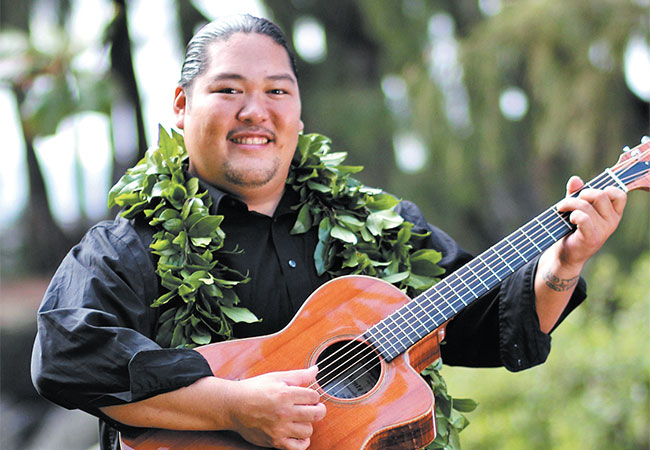At Ease, At Last

Mark Yamanaka once believed he wasn’t supposed to sing Hawaiian music because he wasn’t “a child of the land.” Good thing this Hoku award-winning falsetto star stopped believing in falsehoods.
Sometimes the ease with which musician Mark Yamanaka operates on stage, soothing listeners with his rich falsetto offerings while effortlessly strumming on an acoustic guitar or ukulele, makes you believe he’s always been comfortable performing Hawaiian originals or standards for others.
Uh-uh.
First introduced to the contemporary sounds of Kapena and Kaau Crater Boys at age 12, Yamanaka began teaching himself how to play the ukulele in order to keep up with the deliciously fast licks of uke wizards Kelly Boy De Lima and Troy Fernandez. At 14, he then turned his attention to the guitar and to imitating the vocal stylings of falsetto greats Aunty Genoa Keawe and Gary Haleamau, and loved every minute of every practice session.
And yet in between those years, the Mililani-born artist purposely hid these abilities away within the confines of his bedroom, guilt-stricken that his burgeoning talents had pushed him into a world he erroneously believed was kapu for non-Hawaiians.
“I actually felt shame whenever I played Hawaiian music because I didn’t have Hawaiian blood, so I kept my singing and playing to myself,” says Yamanaka, who relocated to Hilo with his family shortly before entering grade school. “And it was a real struggle for me because, while I knew I loved the music of the Islands, I also knew I wasn’t a child of the land.”
Those feelings began to change during Yamanaka’s junior year, however, as he was invited to join in on jams with several high school buddies and, surprisingly, he accepted their offer. His talents finally on display beyond his four bedroom walls, Yamanaka felt relieved when these same friends reacted favor-ably to his musicianship, and encouraged him to showcase his abilities to a wider audience.
“The fact that these guys were Hawaiian and that they were welcoming my talents into what they were doing, that was huge for Today, Yamanaka is much older, wiser and more than comfortable with himself in the Hawaiian music realm. You can catch the four-time Na Hoku Hanohano Awards winner and Johnny Lum Ho protégé performing original and standard tunes from Hilo to Hanalei. (Just the other week, in fact, he commanded a stage in Waikiki at the annual Pro Bowl Block Party, playing favorites from his two solo albums – Lei Pua Kenikeni and the recently released Lei Maile.)
You also can catch this Hawaiian music gem whenever you’re in Hilo and looking for a ride. Drop by Aiona Car Sales, where Yamanaka works as a salesman, and ask for him. He’ll hook you up with a brand new car or even a rental. But don’t forget the song request. It comes free of charge.
“It happens all the time,” Yamanaka says, breaking into laughter as he recalls the number of requests he’s received from car shoppers over the years. “Sometimes, I’ll ask the customer what song he or she likes. Other times, my coworkers will set the stage by telling the customer, ‘Go ask him to sing you something from Luther Vandross, Peabo Bryson, or Celine Dion. He’s professional, you know?'”
Although appreciative of finding the courage to share his musical gifts with others, Yamanaka also is grateful to have discovered a career beyond professional music.
“Music won’t always be there for me,” he says. “My job as a musician is extra. But being a car salesman is my main source of income. This is a job that keeps me grounded and reminds me that I have a responsibility to my family.”
Here’s what else Yamanaka told Musical Notes:
MN:You dedicated your latest album, Lei Maile, to the memory of your grandmother, Doris Guerrero.
Why is that?
MY: She was the one who introduced me to falsetto singing. She was also the one who taught me the classic Kanaka Waiwai. Thing is, she could-n’t sing. In fact, she used to joke that she sounded like a horse! When she passed away while I was recording Lei Maile, it seemed like the right thing to do, to dedicate the album to her and honor her for all she taught me.
MN: Hilo must be proud that it has its own “Singing Car Salesman.” How did you land that job?
MY: I basically grew up with the Aiona family, having been pretty close to their sons. In 2006, I got a call from the family asking if I wanted to make a career out of working for the dealership. At the time I was working for a bank, but when the Aionas promised they would work around my gigging schedule, I said yeah, I’d give it a try.
MN: Where are you playing next?
MY: Probably in Hilo. But people can always find out where I’m performing by visiting my Facebook page. Or, they can just call me up at Aiona Car Sales!





